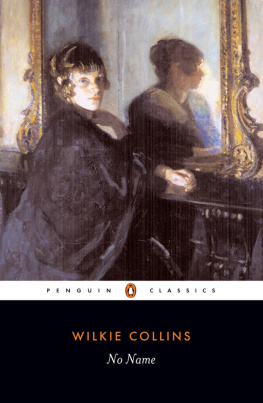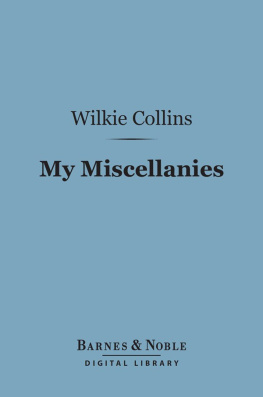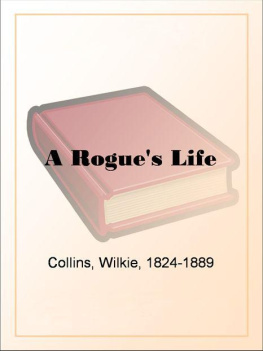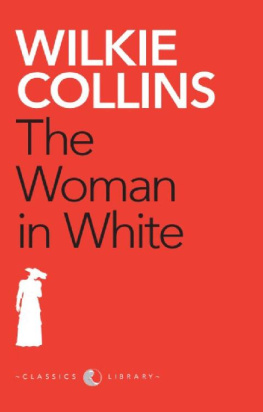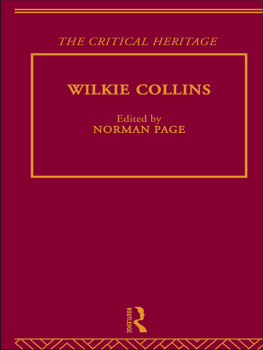Wilkie Collins - No Name
Here you can read online Wilkie Collins - No Name full text of the book (entire story) in english for free. Download pdf and epub, get meaning, cover and reviews about this ebook. year: 1862, publisher: Penguin Classics, genre: Detective and thriller. Description of the work, (preface) as well as reviews are available. Best literature library LitArk.com created for fans of good reading and offers a wide selection of genres:
Romance novel
Science fiction
Adventure
Detective
Science
History
Home and family
Prose
Art
Politics
Computer
Non-fiction
Religion
Business
Children
Humor
Choose a favorite category and find really read worthwhile books. Enjoy immersion in the world of imagination, feel the emotions of the characters or learn something new for yourself, make an fascinating discovery.
- Book:No Name
- Author:
- Publisher:Penguin Classics
- Genre:
- Year:1862
- Rating:5 / 5
- Favourites:Add to favourites
- Your mark:
- 100
- 1
- 2
- 3
- 4
- 5
No Name: summary, description and annotation
We offer to read an annotation, description, summary or preface (depends on what the author of the book "No Name" wrote himself). If you haven't found the necessary information about the book — write in the comments, we will try to find it.
No Name — read online for free the complete book (whole text) full work
Below is the text of the book, divided by pages. System saving the place of the last page read, allows you to conveniently read the book "No Name" online for free, without having to search again every time where you left off. Put a bookmark, and you can go to the page where you finished reading at any time.
Font size:
Interval:
Bookmark:

NO NAME
WILKIE COLLINS was born in London in 1824, the eldest son of the landscape painter William Collins. In 1846, having spent five years in the tea business, he was entered to read for the bar at Lincolns Inn, where he gained the legal knowledge that was to give him much material for his writing. From the early fifties, he was a friend of Charles Dickens, acting with him, contributing to Household Words, travelling with him on the Continent. Dickens produced and acted in two melodramas written by Collins, The Lighthouse (1855) and The Frozen Deep (1857). Of his novels, Collins is best remembered for The Woman in White (1860), No Name (1862), Armadale (1866) and The Moonstone (1868), which T. S. Eliot called the first, the longest, and the best of modern English detective novels. Wilkie Collins, who braved Victorian morals by living with one mistress and maintaining another in a separate establishment, died in 1889.
MARK FORD was born in 1962. He has a BA and a D.Phil. in English Literature from Oxford University. His publications include the poetry collections Landlocked (1992) and Soft Sift (2001), and a critical biography of the French writer Raymond Roussel, Raymond Roussel and the Republic of Dreams (2000). He is currently a lecturer in English Literature at University College London. He has also edited Charles Dickenss Nicholas Nickleby for Penguin Classics.
WILKIE COLLINS
Edited with an Introduction and Notes by
MARK FORD
PENGUIN BOOKS
PENGUIN BOOKS
Published by the Penguin Group
Penguin Books Ltd, 80 Strand, London WC2R 0RL, England
Penguin Group (USA), Inc., 375 Hudson Street, New York, New York 10014, USA
Penguin Books Australia Ltd, 250 Camberwell Road, Camberwell, Victoria 3124, Australia
Penguin Books Canada Ltd, 10 Alcorn Avenue, Toronto, Ontario, Canada M4V 3B2
Penguin Books India (P) Ltd, 11 Community Centre, Panchsheel Park, New Delhi 110 017, India
Penguin Books (NZ) Ltd, Cnr Rosedale and Airborne Roads, Albany, Auckland, New Zealand
Penguin Books (South Africa) (Pty) Ltd, 24 Sturdee Avenue, Rosebank 2196, South Africa
Penguin Books Ltd, Registered Offices: 80 Strand, London WC2R 0RL, England
www.penguin.com
First published 1862
Published in Penguin Books 1994
Reprinted with a new Chronology and updated Bibliography 2004
12
Introduction, notes and bibliography copyright Mark Ford, 1994, 2004
Chronology copyright Matthew Sweet, 1999
All rights reserved
The moral right of the editor has been asserted
Except in the United States of America, this book is sold subject
to the condition that it shall not, by way of trade or otherwise, be lent,
re-sold, hired out, or otherwise circulated without the publishers
prior consent in any form of binding or cover other than that in
which it is published and without a similar condition including this
condition being imposed on the subsequent purchaser
EISBN: 9781101492345
No Name (1862) is the second, and perhaps the least characteristic, of the four great novels published by Wilkie Collins during the 1860s. It was written at the height of his popularity; his previous book, The Woman in White (1860), had proved a runaway bestseller, and Collins suddenly found himself at the top of the tree,), while its successor, Armadale (1866), he pre-sold to Smith and Elder for the even more outlandish sum of 5,000. Nobody but Dickens, he notes proudly, has made as much.
It is generally agreed that The Woman in White inaugurated the genre of the Sensation Novel which so dominated the fiction market of the ensuing decade, during which writers such as Mrs Henry Wood, Mary Braddon, Charles Reade and Sheridan Le Fanu all achieved impressive sales with variations of the essential Collins theme the grisly skeleton lurking in the highly respectable cupboard. To Mr Collins, as Henry James pointed out in a review of Mary Braddons Aurora Floyd in 1865, belongs the credit of having introduced into fiction those most mysterious of mysteries, the mysteries that are at our own doors.
Collins was determined, however, to avoid simply repeating the winning formula of The Woman in White. In the preface to No Name he draws the readers attention explicitly to the new novels divergence from its predecessor:
It will be seen that the narrative related in these pages has been constructed on a plan, which differs from the plan followed in my last novel, and in some other of my works published at an earlier date In trying this new ground, I am not turning my back in doubt on the ground which I have passed over already. My one object in following a new course, is to enlarge the range of my studies in the art of writing fiction, and to vary the form in which I make my appeal to the reader, as attractively as I can.
Charles Dickens, for one, was particularly impressed by this aspect of his protgs inventiveness: I find in the book every quality that made the success of the Woman in White without the least sign of holding on to that success or being taken in tow by it, he commented enthusiastically in a letter to Collins shortly before serialization began in Dickenss own magazine, All the Year Round.
The suspense generated by No Name is of a quite different kind from that which mesmerizes the reader of The Woman in White, Armadale or The Moonstone (1868). The book features no mysterious apparitions, foreboding dreams, Shivering Sands, or exotic Orientals. Combe-Raven, where the story begins, is a placid, utterly commonplace country residence which Collins takes pains to evoke in the opening pages in the most realistic of ways: details such as the ticking clock, the red-nosed housemaid, the snoring dog, the cook with her rheumatism, the kindly twinkling head of the family taking his Scottish terrier for an early morning walk, combine to create a reassuring tableau of stability and ordinariness. Subliminally and because this is a Wilkie Collins novel one intuits everything is about to go horribly wrong, but the subtly suffused aura of impending catastrophe is all the more disturbing for being so hard to locate.
Whereas in most Collins novels the narrative is determined by the characters attempts to follow a series of clues that lead them to the truth about some mysterious event in the past, in No Name, conversely, it is the disclosure of the books single secret early on which initiates its main action. From that point, as Collins explains in the Preface, all the main events of the story are purposely foreshadowed, before they take place my present design being to rouse the readers interest in following the train of circumstances by which these foreseen events are brought about. Despite his meticulous researches, Collinss fictions often contain turns of event so zany they leave even the most credulous staggering one thinks particularly of Poor Miss Finch (1872), in which the blind heroine first recovers her sight, then loses it again, while the hero has dark blue skin as a result of the medicine he takes to cure his epileptic fits! but in No Name Collins barely flouts the laws of probability. The revelation of the Vanstone daughters illegitimacy, and their consequent loss of social status and all inheritance rights, is distressingly believable, and, more importantly, it opens the novel out towards all sorts of compelling moral, social and legal issues. Even the dour lawyer Mr Pendril is provoked into a growl of dismay when he contemplates the sisters plight:
Font size:
Interval:
Bookmark:
Similar books «No Name»
Look at similar books to No Name. We have selected literature similar in name and meaning in the hope of providing readers with more options to find new, interesting, not yet read works.
Discussion, reviews of the book No Name and just readers' own opinions. Leave your comments, write what you think about the work, its meaning or the main characters. Specify what exactly you liked and what you didn't like, and why you think so.

